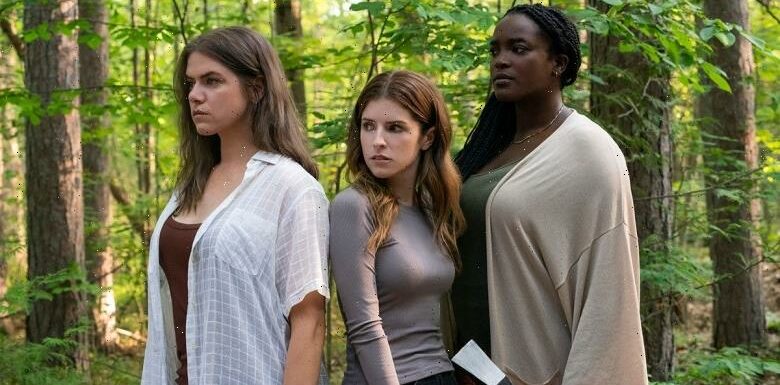
While not quite the taut thriller it’s been billed as, “Alice, Darling” centerpieces Anna Kendrick in her best performance since “Up in the Air” made her a star (and Oscar nominee) in 2009. Kendrick is in every scene of Mary Nighy’s drama about a woman (Alice) whose reality comes crashing down over the course of a girls’ trip to a lakeside cabin: The reality is that she’s in an abusive relationship with a Newcastle artist named Simon (Charlie Carrick), who has a chokehold on her every move and decision, from her whereabouts to what she’s wearing.
“Alice, Darling” runs out of emotional impact despite a lean 89-minute running time that already feels too long, though Kendrick capably carries her character’s emotional arc from self-deception and denial to revelation and escape.
The movie opens with a close-up on Alice’s face, appearing pensive while floating underwater. It’s the sort of vaguely metaphoric shot we know will serve as a bookend, and it eventually does as the movie wraps up. Cut to Alice in the city, meeting her friends Tess (Kaniehtiio Horn of “Letterkenny”) and Sophie (Wunmi Mosaku, “Lovecraft Country”) for dinner. Tess has a birthday looming and so proposes the idea of a cottage trip; it’s immediately obvious that Alice is thrown off by the idea, though we’re unsure why.
Meanwhile, the very dashing waiter keeps making eyes at Alice, and for a minute you think this might be the meet-cute that eventually winds Alice up into a not-so-cute toxic relationship. Not so. Alice mentions Simon, her longtime boyfriend, and his upcoming art show. Tess, an aspiring but far less successful artist herself, is less supportive about Simon. Is it because her friends aren’t in happy about the psychological damage he’s inflicting on Alice? By the end of the film, we discover how very little they knew.
That’s because Alice, as anyone locked in a Stockholm Syndrome-like relationship marked by gaslighting, verbal abuse, and control, is adept at compartmentalizing the person she is with Simon and the one she is out in the world and with her friends. In the restaurant bathroom, she sends a snap of her cleavage to Simon at his behest, signaling just the kind of sway he has over her even in moments where she’s with other people.
Back at home, she finds the waiter’s number on the receipt in her pocket, and not only rips it up, but also washes out the ink before throwing it in the trash, implying that Simon is the kind of guy who probably goes through the garbage looking for evidence like this.
While Alice clearly isn’t in any kind of therapy, and isn’t even honest with herself about what’s going on, she’s found one coping mechanism: trichotillomania. In moments of crisis or anxious unease, she pulls out strands of her hair by the roots, taking no pleasure in the self-destructive act, but using it as you would drugs or alcohol to cope with stress. These are hard-to-watch moments, but Kendrick, ever a game comic actress and rarely given a dramatic leading showcase, effectively conveys her character’s inescapable mental torment. Later, in the shower, Simon sneaks up on her for sex she’s all too willing to comply with despite her unsettled mood.
Everything comes crashing down during the girls’ trip, which Alice has lied to Simon about under the pretense of needing to go on a last-minute business trip. His texts are relentless, and his surveillance makes it difficult for Alice to relax with Tess and Sophie. Meanwhile, in the background, a local girl has gone missing — a red-herring device that might provide some shades to Alice’s character but that ultimately goes nowhere. Alice, rather than catch up with her friends, heads into search parties with the locals.
The movie, from here, precedes to meander until the inevitable, as Simon shows up at the cabin after Alice repeatedly ignores his increasingly menacing missives. Her friendships are already fraying over the course of the short trip, despite some nice sing-song moments to Lisa Loeb and nostalgic reminiscences of better times. When Tess does get to the bone of what’s happening to Alice, it’s gutting: “He wouldn’t love me if he knew how bad I am.”
Kendrick has said that she drew from her own experiences in a toxic relationship to channel Alice, and that shows: It’s a performance of understatement and quiet melancholy, and she rarely goes into full freakout moment outside of the bathrooms she shuts herself in to scream and pull her hair out. “Alice, Darling” makes the case for Kendrick as a dramatic actress, especially when she’s carving out her own material on personal terms (she’s also an executive producer here).
The script from Alanna Francis, however, could use that level of focus. Alice’s journey is a compelling one as she finds her way back to herself, but the movie feels overlong in its second act. While Francis and director Mary Nighy (who’s helmed on HBO’s excellent and underseen “Industry”) surely didn’t want to make a film totally about Alice and Simon’s dynamic (as he gets relatively little screen time), “Alice, Darling” could have benefited from more tension.
Visually the movie lacks in visual imagination, with cinematographer Mike McLaughlin and Nighy mainly directing via coverage shots when not in close-up on Alice, and they don’t contribute to what feels like a true cinematic experience on the big screen. (“Alice, Darling” has the feeling of a decent streaming movie.) Still, Kendrick makes the case for why she belongs in more dramatic roles that allow her to shed her normally peppy usually cheery onscreen persona. We know how good she is, and we’d only love to see more.
Grade: C
“Alice, Darling” premiered at the 2022 Toronto International Film Festival. It will be released theatrically by Lionsgate at a later date.
Source: Read Full Article